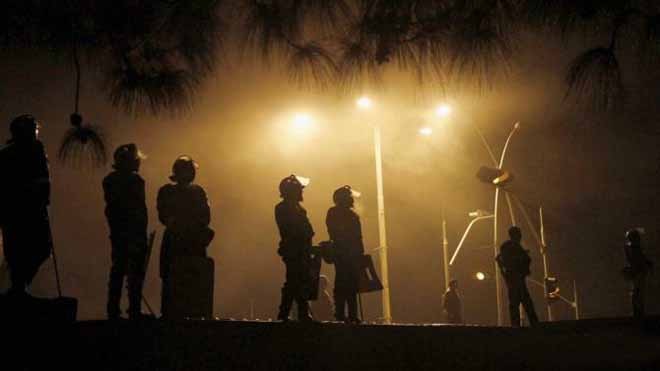
Invoking Article 245 sent out a message of weakness of the government

As the protestors led by Imran Khan began their march towards Islamabad for the Independence Day on August 14, the federal government came up with its plan to thwart them.
A confrontation seemed likely but that did not happen as the government let the protestors enter the Red Zone in Islamabad without much resistance. However, initially, it appeared that the government panicked -- with reports of arrests of political workers of both marches and blocking of entry and exit points into Islamabad.
Another important step that the interior ministry took was invoking Article 245 of the Pakistan Constitution, which happened a few weeks before the protest. The interior ministry cited terrorism as an excuse for it but in actuality, observers feel that this measure was taken because of perception found among the civilian power circles that there may be military establishment behind these street agitations, since civil-military relations have remained tense ever since Nawaz Sharif took oath last May.
"What they were trying to do was to subvert the military itself. As it is widely believed that the military is behind these protests -- the government thought: let’s put the military at the forefront of this confrontation. This was a checkmate move that the Nawaz setup thought of," says Ayesha Siddiqa, a defense expert, based in Islamabad.
Article 245 has been invoked before, too, once by Nawaz Sharif only in the nineties in Sindh province, and then by Zulfikar Ali Bhutto in 1977. Interestingly, one of the reasons cited for the dismissal of the Benazir government in the 1990 was government’s failure to protect lives of citizens, especially in Karachi. And the courts justified the dissolution of the assemblies for this reason, among others, and condemned Benazir Bhutto for its failure to invoke Article 245 to maintain law and order.
However, experts feel that the move itself undermined the authority of the civilian government and has sent a message of weakness. It also shows that the police, who are responsible for maintaining law and order in the country, have once again been pushed back from what their basic duty is.
"Why did they call in the army? Article 245 is a necessary tool for governance, but it should not be invoked for such civilian matters, since there is a political impact of calling in the military, especially on the civilian security apparatus. The government could have invoked sections of Anti Terrorism Act and Pakistan Protection Act if it had cited terror threats," says Asad Jamal, a legal expert based in Lahore.
Observers say that handing over security affairs to the armed forces is a trend that civilian governments have had a habit of in the past, too. And this militarisation of the civilian affairs has a lot of history behind it. But it is interesting to note that the army has not been asked to manage security affairs in Punjab province -- which is thought to be the political and military headquarters for Pakistan.
"From Balochistan to Sindh to the Frontier regions, paramilitary and the military forces are managing law and order. Be it Karachi where Rangers come in or the Gilgit Baltistan region, where the army decides matters, this militarisation of major parts of the country -- and then also controlling the defence and the foreign policy of Pakistan -- needs to stop, if the government wants to have civilian supremacy in the country. The performance of the Pakistani police is already questionable and needs to be improved but instead of doing that, the government chose to call in the armed forces," adds Jamal.
Jamal also feels that when Article 245 is invoked, the enforcement of fundamental rights of the people is compromised and, hence, its imposition is a concern as it may not be in public interest.
And when, earlier this week, the protestors were allowed inside Islamabad’s Red Zone, the police acted as a bystander while the military was the only force that seemed to be in control of the situation. Eyewitness accounts from the Parliament House confirm that at one point, when Tahir-ul-Qadri started inciting his followers of not letting those go who were leaving the National Assembly building, it was a military personnel that intervened and because of which the crowd backed off.
"The government knew that the protestors would respect the military so, in a way, it was also trying to ensure that things don’t go out of control. But it sent a message of weakness of the government. Principally, it is an uncomfortable thought when the army is called in but this is the game of nerves. Those behind these protests are using their pressure tactics through these political proxies and in return, Nawaz is doing the same," adds Siddiqa.